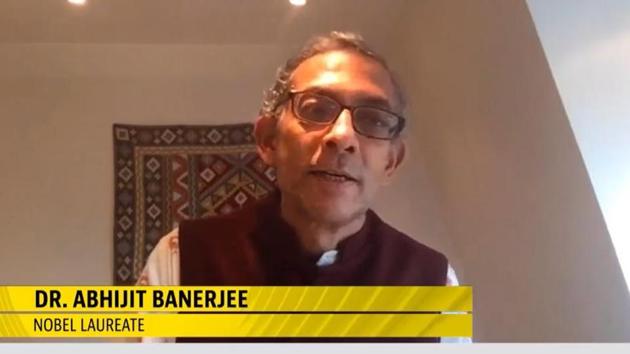HTLS 2020: No guarantee that we’re out of Covid-19 pandemic, says Abhijit Banerjee
Abhijeet Banerjee was awarded the 2019 Nobel in economics along with Esther Duflo and Michael Kremer. He talked about the economic recovery after the Covid-19 pandemic, federalism in India and other issues.
Nobel laureate Dr Abhijit Banerjee said on Thursday that the Covid-19 pandemic is far from over, and that economic recovery will take time.

“There are two issues to worry about - one of them is Covid-19 pandemic, I think nobody knows why it is going down. It’s clear that measured rate is going down, but we have no basis to assume that we are out of the pandemic. We shouldn’t be pessimistic, but there is no coherent explanation as to why it is going down. Then there is vaccine, which is still a long way away. We need two quarters to figure out how to vaccinate 1.4 billion people,” he said.
Watch: Farmer protest: Nobel laureate Abhijit Banerjee decodes situation #HTLS2020
“The second thing is that The bounce has been slow actually. We got about 8% bounce and one of the reasons is a massive demand shortage. The domestic economy is not offering huge rewards. People are sitting on their money. We need a demand bounce, and that hasn’t really happened,” the noted economist added.
Dr Banerjee also said that he doesn’t know how quickly the recovery will be.
The Nobel laureate further talked about the steps taken by the government - Reserve Bank of India (RBI) in particular - in India, including the loan moratorium. He said that policymakers worked towards ensuring that the banks don’t collapse. “So the loans were rescheduled and the reason why it was important was because the banking sector was already on a shaky ground. But I still don’t think the banking sector is out of the woods,” said Dr Banerjee.
He also said that the Covid-19 pandemic was a time to go for some radical things. “I have always taken a view that there should be more fiscal stimulus, but the question is: How much of deficit the government is willing to run. I think the government’s primary commitment was to bail out the banks, and it couldn’t afford more than that. This was a time to do radical things, like selling the banks. In that sense, I think this is a wasted crisis, we could have done more on the fiscal side,” said Dr Banerjee.
Dr Banerjee, along with his colleagues at the Jamal Abdul Latif Poverty Action Lab (J-PAL), has borrowed Randomised Control Trials (RCTs) from the realm of medical sciences – something all of us have been following during the Covid-19 vaccine trials – to argue that experiments, not grand theories, can tell us what works best against poverty in the world. While his approach triggered a debate, Banerjee was awarded the 2019 Nobel in economics along with Esther Duflo and Michael Kremer.



